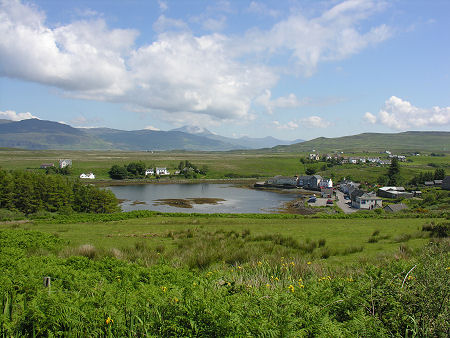 Bunessan from the West |
Mary Macdonald lived from 1789 to 21 May 1872. She was a Gaelic poet whose best known hymn was set to a tune later named after her home village of Bunessan on Mull. The wider picture in Scotland at the time is set out in our Historical Timeline.
Mary MacDougall was born in the tiny crofting settlement of Ardtun, north-east of Bunessan on the Ross of Mull, the peninsula on Mull that extends towards Iona. Her father, Duncan MacDougall, was a farmer. She married Neil Macdonald and settled down to the arduous life of a crofter's wife. While sitting at her spinning wheel she passed the time by singing hymns and poems, some of her own composition.
As a devout Baptist, some of Mary's hymns reached a wider audience. One in particular, entitled Leanabh an Aigh was set to a traditional Scottish tune. The hymn was still in use in the area when Lachlan Macbean was doing the research for his Songs and Hymns of the Scottish Highlands which was published in 1888. Macbean translated the title of Mary's hymn into English as "Child in the manger" and named the tune to which it was sung "Bunessan". Macbean's translation of Mary's hymn was included in the 1927 Revised Church Hymnary, and in many more recent hymn books.
Meanwhile, the tune "Bunessan" which Mary did not write but helped popularise by attaching it to her hymn, has since achieved an even wider audience. The editors of the influential 1925 hymn book Songs of Praise asked the English writer Eleanor Farjeon to write another hymn to the tune. The result was "Morning has broken".
Mary Macdonald would probably be amazed by the way her hymn has brought her fame. The rest of her work is less well known, though one satirical poem about tobacco was said to have been her response to her husband's smoking. A monument to Mary Macdonald has been erected beside the main road just under two miles east of Bunessan, not far from the ruin of the croft in which she lived.
This biography draws on research first published in "The Biographical Dictionary of Scottish Women".
